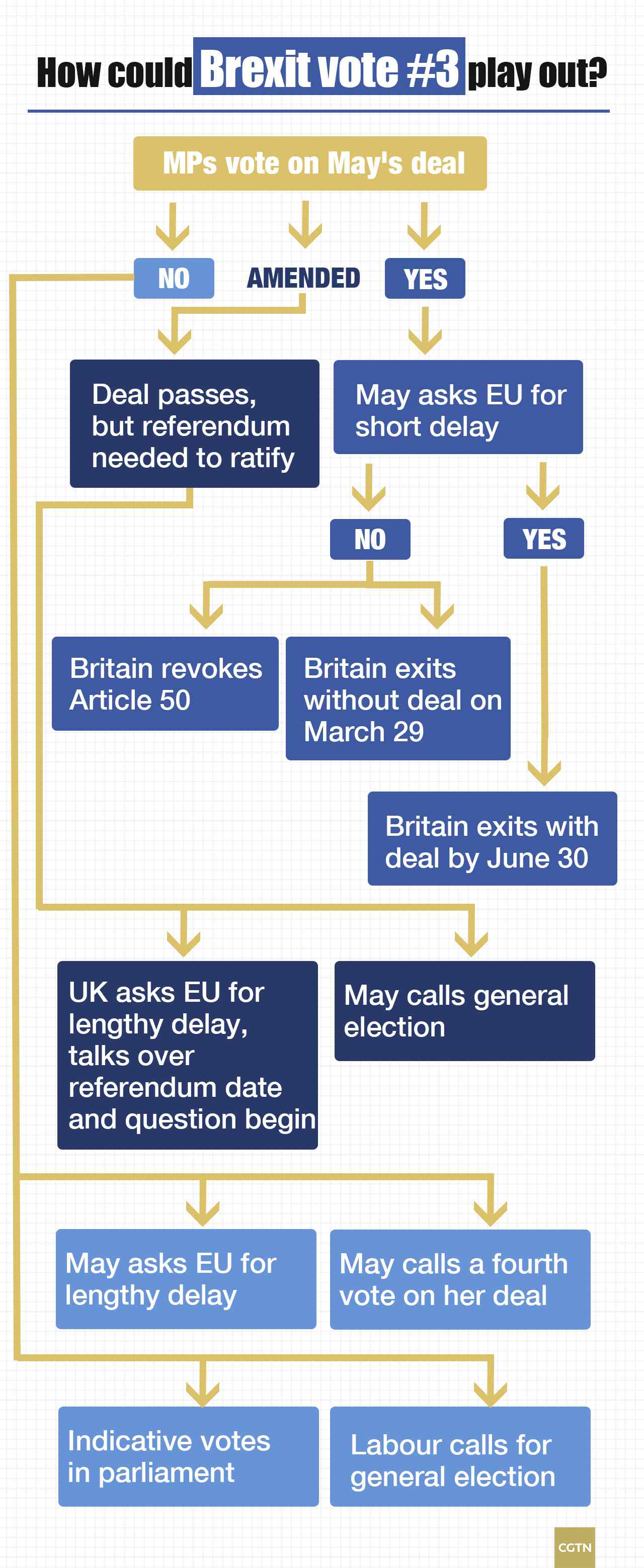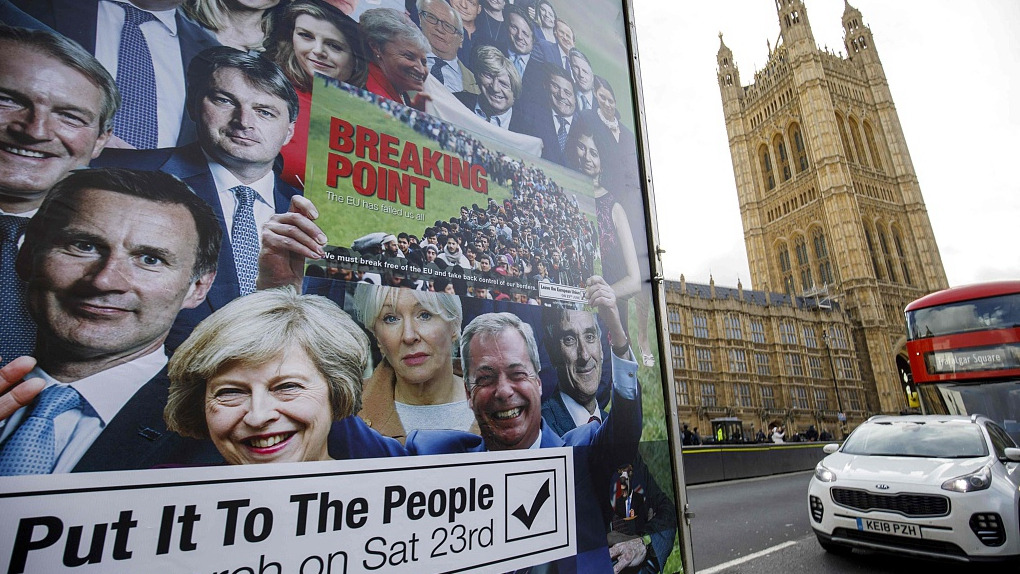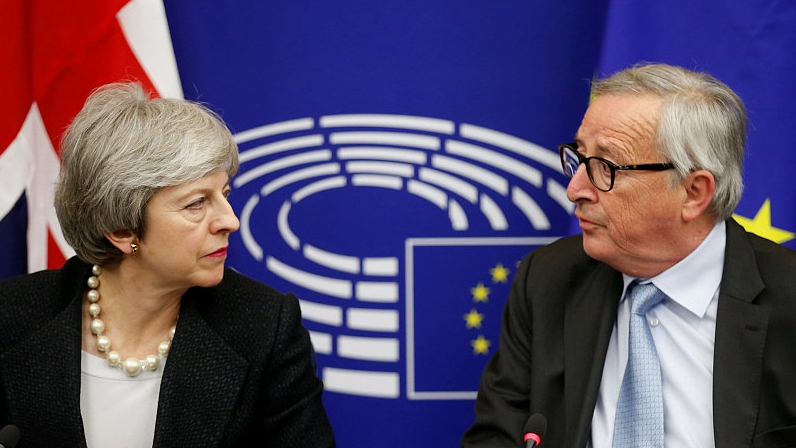
Europe
17:04, 18-Mar-2019
Deal and delay? How the Brexit week could unfold – in five steps
Updated
11:40, 19-Mar-2019
By John Goodrich

The latest dramatic Brexit week could see a third attempt to pass Theresa May's deal and a renewed effort to force a second referendum, and will wrap up with a European Union summit at which the UK prime minister will ask the bloc to extend Article 50.
Here's how the week could play out:
1. Intensive lobbying
Monday/Tuesday/Wednesday
The chances of a third vote on May's deal taking place this week were hit on Monday when Speaker of the House of Commons John Bercow ruled that any proposal had to be substantially different from those previously rejected.
The decision came amid two intensive lobbying campaigns: One from the government, the other from the opposition Labour Party.
The government needs to flip 75 votes to win a majority for May's deal. Its only chance is to persuade the Democratic Unionists (DUP), the small Northern Irish party that props up May's Conservative Party in parliament, to back the agreement. One part of the game plan is offer legal clarifications on the contentious Irish backstop. Another is reported to include additional funding for Northern Ireland if the party backs May's deal.
If the DUP does back the deal, many hardline Conservatives will follow. Several big name Brexiteers have already changed course and said they will vote "yes." However a hardcore of Conservative opposition remains, so lobbying will also focus on turning enough Labour MPs to win a majority.
Simultaneously, Labour will try to keep its MPs on side while rallying support from other opposition parties for a softer compromise deal, a second referendum or a no-confidence vote.
The government will now consider how to proceed if it wants to hold a third vote, with several options available to it. It could delay until after the upcoming European Council meeting, offer a major change, or attempt a procedural measure to circumvent Bercow's ruling.
- A third Brexit vote will only be held if there are substantial changes to the proposal.
- Not holding a vote will mean May asking the EU for a lengthy delay to Brexit.

2. Third time lucky?
Tuesday/Wednesday/Thursday
May was expected to ask MPs to vote on her Brexit deal for a third time on Tuesday or Wednesday. The intervention of Bercow means this is now unlikely, but not impossible.
The first attempt went down by 230 votes and the second by 149, but there had been a growing expectation that a third would be close. That's because pro-Brexit MPs who previously voted against now fear a worse outcome than May's deal: No Brexit.
Several prominent Brexiteers who have called on their colleagues to join them in supporting the deal have linked their votes to May's leadership, suggesting she should step down as prime minister in the near future.
- A win would mean exit with May's deal by June 30, assuming the EU agrees to a delay.
- A loss would probably mean a lengthy delay and indicative votes, or even a general election.
3. Deal… but with one condition
Tuesday/Wednesday/Thursday
Several amendments to the meaningful vote, if it goes ahead, will be proposed. The most talked about is by two Labour MPs, Peter Kyle and Phil Wilson, that would see the opposition party abstain – allowing the deal to pass – on the condition a second referendum is held to ratify it.

A van promoting the People's Vote campaign outside the Houses of Parliament in London, March 7, 2019. /VCG Photo
A van promoting the People's Vote campaign outside the Houses of Parliament in London, March 7, 2019. /VCG Photo
This would put the government in an awkward spot. It may be May's best chance of passing her deal, but she has strongly opposed another referendum.
If the amendment won a majority, the prime minister would be expected to ask for a lengthy delay to Brexit to organize a new public vote and a fresh fight over the options on the ballot would ensue.
- A referendum would ignite a clash over options on the ballot paper: No-deal, May's deal and remain?
- May could try to force a general election rather than allow a second referendum.
4. No-confidence vote
Wednesday/Thursday
Opposition leader Jeremy Corbyn has indicated that his Labour Party will table a no-confidence motion in the government if the deal and the second referendum amendment fail.
If passed, a two-week period to form a new government would follow. If a new government wasn't formed, a general election would follow. This would require a lengthy Brexit delay.
For Labour to win a majority, some Conservative votes would be needed. The strength of feeling against the prime minister and her handling of Brexit among some on right of the party means this isn't totally outlandish, but would be a longshot.
- A general election would exacerbate splits in both major parties: It's unclear how either could run on unified Brexit position.
- Polling suggests that at present, no party would gain a majority in an election.
5. Will the EU agree?
Thursday/Friday
The week concludes with a European Council meeting in Brussels, at which May is expected to ask the other EU leaders to allow Britain to delay its exit from the bloc.
The delay requested is dependent on what happens earlier in the week: If May's deal passes, she will ask for a short extension to allow time to pass necessary legislation; if it is defeated or not voted on, she will ask for a lengthy delay to come up with a new plan.
If May narrowly loses a third vote or it isn't held, she could still ask for approval for both a long and short delay – with the possibility of another meaningful vote next week.

British Prime Minister Theresa May and Jean-Claude Juncker, president of the European Commission, at a news conference in Strasbourg, France, March 11, 2019. /VCG Photo
British Prime Minister Theresa May and Jean-Claude Juncker, president of the European Commission, at a news conference in Strasbourg, France, March 11, 2019. /VCG Photo
European Council President Donald Tusk has called on EU leaders to consider a delay of up to two years.
However, exasperation at the Brexit process is growing in EU capitals and all 27 leaders must agree to any extension. They may set out conditions for any delay, and are unlikely to grant an extension unless there is a clear roadmap.
- A delay beyond June 30 would mean Britons voting in the European Parliament elections.
- Suggestions of a two-year delay may help to swing more MPs behind May's deal.

SITEMAP
Copyright © 2018 CGTN. Beijing ICP prepared NO.16065310-3
Copyright © 2018 CGTN. Beijing ICP prepared NO.16065310-3